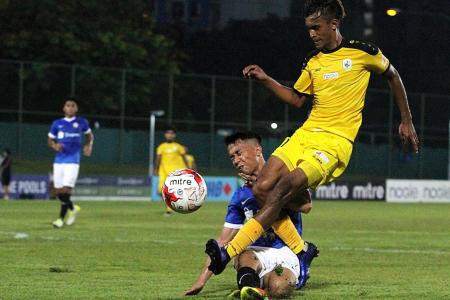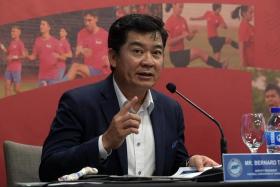Lim: ‘FAS must retain control over league’
Can privatisation transform the S.League? Football chief Lim says...
With stagnant attendances and most clubs living from hand to mouth, it is fair to say that the S.League sorely needs revival.
Lim Kia Tong, the newly appointed president of the Football Association of Singapore (FAS), admitted to The New Paper in an interview on Monday that there is a strong need for change.
"There is strong evidence to suggest that the current model has not worked," the 64-year-old lawyer said.
Currently, most local clubs receive around $800,000 in annual subsidies by the Tote Board and it forms a large part of the annual operating budget of about $1.2 million for each team.
For some clubs, this is supplemented by clubhouse operations which include income from lottery sales and jackpot machines and, to a lesser extent, sponsorships and donations.
Gate receipts and prize money are more unpredictable sources of revenue.
Therefore, at the crux of the discussion is creating a sustainable league in which clubs no longer depend on handouts to survive.
Lim said: "The S.League is a very complex animal.
"We have been running the S.League with funding from the Tote Board, with the clubs only required to raise the balance of the funding to operate the club.
"In my opinion, the time has come to see how we can run the S.League in such a way that it can be a body that can encourage all the clubs to work hard to be accountable for generating more money than what they have been relying on from the Tote Board.
JACKPOT
"Right from the start, I fully accept that money from jackpot operations is a necessary avenue to at least generate income to help fund operations and the running of football at club level or in general, without relying too much on the funding from the Tote Board.
"However, in view of what has happened in recent times, there seems to be a need for more stringent control over how money from jackpot operations can and should be used.
"We have already suggested that more money from jackpot operations be given back to the growing of football."
While Lim did not commit to any form the S.League may soon take, he offered his take on possible privatisation, and the need for the FAS to retain some say in the running of the league.
Clubs are now registered as societies under the Societies Act. Unlike a private entity, whose directors are financially liable, those of a society are not.
Privatisation of the league will allow for investors to monetise the assets of a football club, a situation that exists in Europe.
The Malaysian Super League has also made a similar move.
Lim said: "When you talk about commercialisation or privatisation, you are talking about the product. Do we have a product, or do every S.League club have a product good enough for privatisation at a club level?
"You can also talk about privatisation of the entire S.League and ask the same question.
"When you talk about privatisation of the whole league, there is a need for us to inject mechanism to show how the FAS, being the controlling body of football in the country, can also have a say over investors who want to take over the league.
"Because if the whole league goes to a commercial entity who buys over, then the way in which they operate the whole league is very crucial for the whole football ecosystem.
"If a privatised entity takes over the league and they are not carrying out certain things which the FAS requires, such as developing youth footballers, and because the FAS has no control over them, that will lead to ugly situations where we cannot develop youth, grassroots and community football.
"This is a very complex thing for us to look into and we will leave no stone unturned to see how to operate the S.League differently from what it has been over the past 20 years."
Get The New Paper on your phone with the free TNP app. Download from the Apple App Store or Google Play Store now



